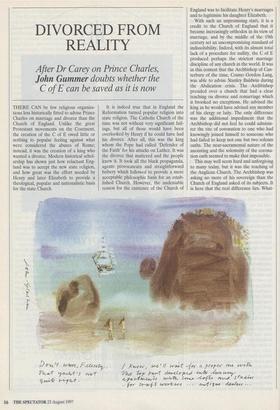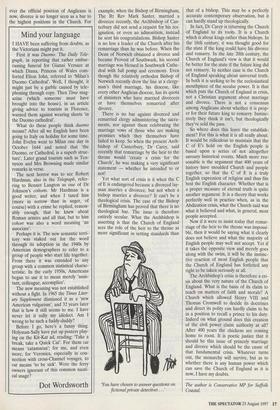DIVORCED FROM REALITY
THERE CAN be few religious organisa- tions less historically fitted to advise Prince Charles on marriage and divorce than the Church of England. Unlike the great Protestant movements on the Continent, the creation of the C of E owed little or nothing to popular feeling against what were considered the abuses of Rome; instead, it was the creation of a king who wanted a divorce. Modern historical schol- arship has shown just how reluctant Eng- land was to accept the new state religion, and how great was the effort needed by Henry and later Elizabeth to provide a theological, popular and nationalistic basis for the state Church. It is indeed true that in England the Reformation turned popular religion into state religion. The Catholic Church of the time was not without very significant fail- ings, but all of those would have been overlooked by Henry if he could have had his divorce. After all, this was the king whom the Pope had called 'Defender of the Faith' for his attacks on Luther. It was the divorce that mattered and the people knew it. It took all the black propaganda, agents provocateurs and straightforward bribery which followed to provide a more acceptable philosophic basis for an estab- lished Church. However, the undeniable reason for the existence of the Church of England was to facilitate Henry's marriages and to legitimise his daughter Elizabeth.
With such an unpromising start, it is a credit to the Church of England that it became increasingly orthodox in its view of marriage, and by the middle of the 19th century set an uncompromising standard of indissolubility. Indeed, with its almost total lack of a procedure for nullity, the C of E produced perhaps the strictest marriage discipline of any church in the world. It was in this context that the Archbishop of Can- terbury of the time, Cosmo Gordon Lang, was able to advise Stanley Baldwin during the Abdication crisis. The Archbishop presided over a church that had a clear teaching on divorce and remarriage which it brooked no exceptions. He advised the king as he would have advised any member of his clergy or laity. The only difference was the additional impediment that the Archbishop did not feel he could adminis- ter the rite of coronation to one who had knowingly joined himself to someone who had failed to keep not one but two solemn oaths. The near-sacramental nature of the anointing and the solemnity of the corona- tion oath seemed to make that impossible.
This may well seem hard and unforgiving to many today, but it was the teaching of the Anglican Church. The Archbishop was asking no more of his sovereign than the Church of England asked of its subjects. It is here that the real difference lies. What- ever the official position of Anglicans is now, divorce is no longer seen as a bar to the highest positions in the Church. For example, when the Bishop of Birmingham, The Rt Rev Mark Santer, married a divorcee recently, the Archbishop of Can- terbury did not send a request for his res- ignation, or even an admonition, instead he sent his congratulations. Bishop Santer is no less a leader of the Church after his remarriage than he was before. When the Dean of Norwich obtained a divorce and became Provost of Southwark, his second marriage was blessed in Southwark Cathe- dral with full pomp and ceremony. Even though the relatively orthodox Bishop of Norwich recently drew the line at a clergy- man's third marriage, his diocese, like every other Anglican diocese, has its quota of ministers who have married divorcees or have themselves remarried after divorce.
There is no bar against divorced and remarried clergy administering the sacra- ments, nor against them celebrating the marriage vows of those who are making promises which they themselves have failed to keep. So when the present Arch- bishop of Canterbury, Dr Carey, said recently that remarriage by the heir to the throne would 'create a crisis for the Church', he was making a very significant statement — whether he intended to or not Yet what sort of crisis is it when the C of E is endangered because a divorced lay- man marries a divorcee, but not when a bishop marries a divorcee? It can't be a theological crisis. The case of the Bishop of Birmingham has proved that there is no theological bar. The issue is therefore entirely secular. What the Archbishop is asserting is that the Church of England sees the role of the heir to the throne as more significant in setting standards than `You have chosen to answer questions on fictional private detectives . . that of a bishop. This may be a perfectly accurate contemporary observation, but it can hardly stand up theologically.
In fact, Dr Carey is returning the Church of England to its roots. It is a Church which is about kings rather than bishops. In the 16th century, it was thought good for the state if the king could have his divorce and remarry. In the late 20th century, the Church of England's view is that it would be better for the state if the future king did not remarry. In neither case is the Church of England speaking about universal truth. In both it is seeking to be the ecclesiastical mouthpiece of the secular power. It is that which puts the Church of England in crisis, not a Christian argument about marriage and divorce. There is not a consensus among Anglicans about whether it is prop- er for their future king to remarry. Instinc- tively they think it isn't, but theologically they've sold the pass.
So where does this leave the establish-, ment? For this is what it is all really about. It would be ridiculous to maintain that the C of E's hold on the English people is based upon a series of not altogether savoury historical events. Much more rea- sonable is the argument that 400 years of history have moulded Church and people together, so that the C of E is a truly English expression of religion and thus fits best the English character. Whether that is a proper measure of eternal truth is quite another argument. It is a theory that works perfectly well in practice when, as in the Abdication crisis, what the Church said was what it believed and what, in general, most people accepted.
Now if it were to insist today that remar- riage of the heir to the throne was impossi- ble, then it would be saying what it clearly does not believe and what the majority of English people may well not accept. Yet if it takes the opposite view and merely goes along with the swim, it will be the instinc- tive reaction of most English people that the Church of England has forfeited any right to be taken seriously at all.
The Archbishop's crisis is therefore a cri- sis about the very nature of the Church of England. What is the basis of its claim to teach on matters of faith and morals? A Church which allowed Henry VIII and Thomas Cromwell to decide its doctrines and direct its polity can hardly claim to be in a position to recall a prince to his duty. Indeed on what ground does this creation of the civil power claim authority at all? After 400 years the chickens are coming home to roost. It is poetic justice that it should be this issue of princely marriage and divorce which should be the cause of that fundamental crisis. Whatever turns out, the monarchy will survive, but as to whether there is any human power which can save the Church of England as it is now, I have my doubts.
The author is Conservative MP for Suffolk Coastal.



























































 Previous page
Previous page